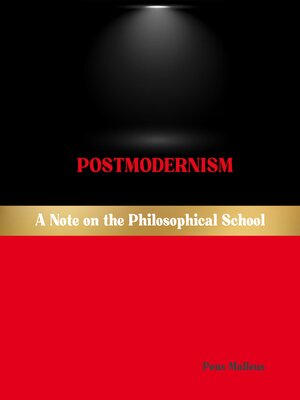Postmodernism
audiobook (Unabridged) ∣ A Note on the Philosophical School · Western Philosophical Schools
By Pons Malleus

Sign up to save your library
With an OverDrive account, you can save your favorite libraries for at-a-glance information about availability. Find out more about OverDrive accounts.
Find this title in Libby, the library reading app by OverDrive.



Search for a digital library with this title
Title found at these libraries:
| Library Name | Distance |
|---|---|
| Loading... |
This audiobook is narrated by a digital voice.
This audiobook is an exploration of one of the most enigmatic, influential, and oft-contested philosophical movements of the twentieth and twenty-first centuries: Postmodernism. In many ways, Postmodernism defies easy classification, resisting the very categories and definitions through which philosophical systems are often understood. It is, by nature, a philosophy of questioning—of established norms, of grand narratives, of claims to universal truth, and of the modernist faith in progress, reason, and objectivity. Where Modernism sought to construct a unified, rational, and scientifically grounded worldview, Postmodernism embraces fragmentation, irony, plurality, and uncertainty.
Postmodernism is not a singular doctrine, nor does it adhere to a strict methodology. It is a loose constellation of thinkers, ideas, critiques, and cultural shifts that emerged in response to the perceived limitations and failures of Enlightenment rationality and modernist ideologies. Figures like Jean-François Lyotard, Michel Foucault, Jacques Derrida, and Jean Baudrillard have come to represent various facets of the postmodern sensibility—each with distinct approaches, yet all engaging with fundamental questions about meaning, power, identity, and representation. This diversity is both the strength and the challenge of Postmodernism: it cannot be reduced to a slogan or manifesto, but must be engaged with as a dynamic and evolving conversation.
This audiobook does not aim to offer a definitive account of Postmodernism—indeed, such an aim would contradict the spirit of the movement itself. Instead, it seeks to provide a clear and thoughtful introduction to the key themes, thinkers, and debates that define postmodern thought. It is written for students, scholars, and curious readers alike—those who may feel both drawn to and disoriented by the complexities of postmodern philosophy.







